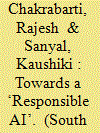| Srl | Item |
| 1 |
ID:
142843


|
|
|
|
|
| Summary/Abstract |
On 1 January 2015, India's 64-year-old apex policy-making body, the Planning Commission, was replaced by a new institution, the National Institution for Transforming India (NITI) Aayog. While it is still too early to assess the NITI Aayog's impact on India's complex policy landscape, or the full extent of its social and political implications, the emerging architecture of the new institution provides valuable insights into the Modi government's economic policy priorities and preferred style of governance. My paper argues that, contrary to the government's claims that the NITI Aayog will spur innovative thinking by objective ‘experts’ and promote ‘co-operative federalism’ by enhancing the voice and influence of the states, the new institution is being crafted to enlarge the power of the executive government and the prime minister. The elimination of the Planning Commission, a once-powerful advocate of public investment-led development, and of the National Development Council, an important platform for states to work together towards common goals, has set the stage for what the NITI Aayog will turn out to be. Developments to watch for include the NITI Aayog's role in diminishing horizontal institutional accountability; in reducing the ability of state governments to negotiate with the central government; and in narrowing intellectual diversity within elite policy circles.
|
|
|
|
|
|
|
|
|
|
|
|
|
|
|
|
| 2 |
ID:
152457


|
|
|
|
|
| Summary/Abstract |
This article critically assesses the impact of the Planning Commission on center-state relations in India. It argues that the Planning Commission had a centralizing effect due to its role in overseeing five year and annual planning, its contribution to designing and overseeing Centrally Sponsored Schemes (CSS), and its involvement in discretionary grant-making. Central policy priorities and inter-state disagreements prevented the Planning Commission from acquiring the role of a shared rule institution, capable of offsetting the centralizing implications of the aforementioned policies. The article then speculates on what prompted the recent replacement of the Planning Commission with the NITI Aayog and what this may mean for shared rule and the nature of collaborative federalism in India more in general.
|
|
|
|
|
|
|
|
|
|
|
|
|
|
|
|
| 3 |
ID:
172219


|
|
|
|
|
| Summary/Abstract |
The impact of artificial intelligence (AI) on every aspect of our lives is inevitable and already being felt in numerous ways. Countries are grappling with the opportunities and challenges that AI presents. Among the South Asian countries, India has taken a lead in promoting and regulating AI. However, it lags significantly behind countries such as China or the United States. This article explores India’s AI ecosystem, the threats and challenges it faces, and the ethical issues it needs to consider. Finally, it examines the common concerns among South Asian nations and the possibility of coming together to promote and regulate AI in the region.
|
|
|
|
|
|
|
|
|
|
|
|
|
|
|
|